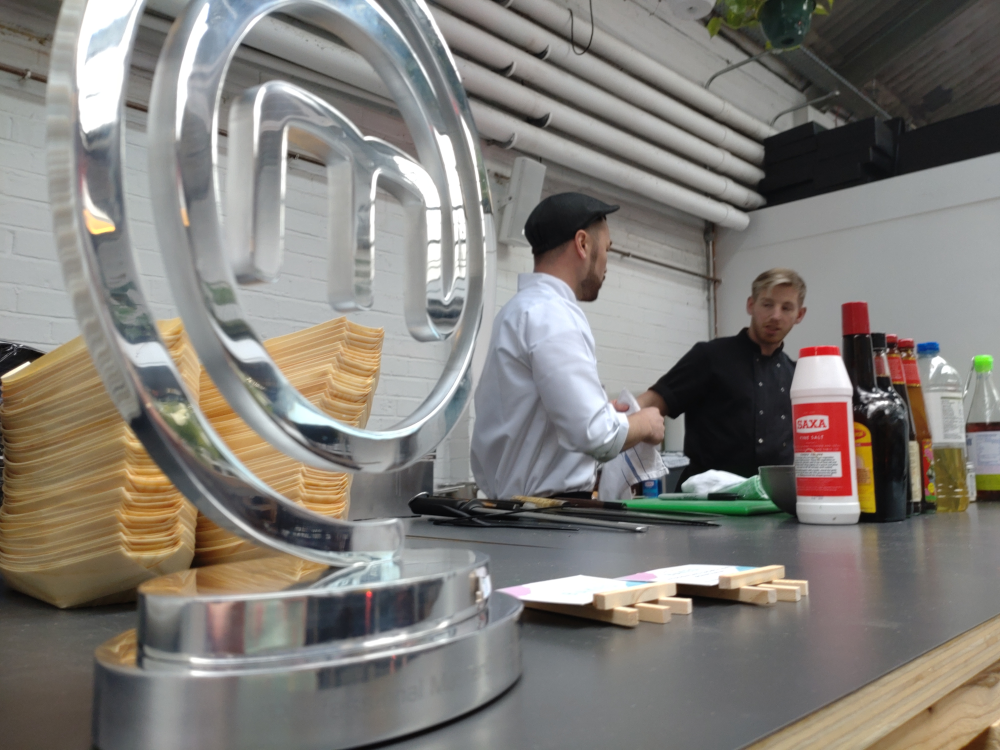Why MasterChef matters
15 May 2025
Creative industries consultant Nick Toon shares his view on why MasterChef is just the start of something much bigger…
Dan Lee & Steven Knight at the announcement of MasterChef moving to Digbeth in 2022
Of course, there's a fairly straightforward answer to the question of 'why MasterChef matters'. It's a great show. Beloved by audiences. Which is why it's been on our screens in numerous guises since 1990.
But it now matters in the Midlands in a much deeper way.
In January of this year, production of the show relocated to Birmingham from London and MasterChef became a keystone in the rebuilding of the West Midlands' screen sector.
Unlike most TV shows MasterChef is pretty much in production all year round, producing four editions (Celebrity, Amateur, Professional and Junior). That's why it is based at its own purpose built studio in Digbeth.
In an industry beset by short runs and brief freelance opportunities (which hugely limits the range of people who can consider a career in it) MasterChef is a rarity; a show that can offer almost continual employment and career development.
The first series has already been shot in Digbeth, the second is in prep, and MasterChef is now beginning to play its part in transforming opportunities for local people in Birmingham and the West Midlands to gain employment in the screen sector, a part of the economy in which the UK excels but in which opportunities in the West Midlands have become increasingly scarce.
Shine’s MasterChef offices in Digbeth
Why is MasterChef in Birmingham?
The arrival of the show in the West Midlands is not an accident. It emerged as part of the BBC commitment in its Across The UK strategy to ensure that more of its shows are made outside of London and the SE.
Since the BBC is funded by Licence Fee payers who live right across the nation, this matters to the organisation for two key reasons.
Firstly, it's crucial that its programmes connect with and reflect the lives of the people of the UK. The people who pay for the BBC. Making shows in all parts of the UK and giving the opportunity to hear different voices tell stories helps it to achieve this objective.
Secondly, as the creative industries have evolved over the past two decades to become a key, and growing, part of the UK's economy, it is vital that the BBC deploys the money it raises from us all to support the development of the UK's key creative clusters, from Belfast to Birmingham, Cardiff to Glasgow.
The BBC is the spinal cord of the UK's domestic screen industry and if, as former Labour Department for Culture, Media and Sport Secretary of State Tessa Jowell said, the Licence Fee is 'venture capital' for the UK's creative economy, then that money needs to be invested in giving opportunity to creative businesses and creative talent throughout the country. Especially if the universal Licence Fee model is going to sustain.
Local MasterChef winner Dan Lee
The long and winding road
Making a commitment is one thing. Making it happen quite another. The original announcement that MasterChef would move to Birmingham came in February 2022. The new studio opened and production finally commenced almost three years later in January 2025.
Ensuring that the show not only arrived in Birmingham but did so in a way that delivers maximum benefit has involved an incredible amount of hard work not just from the BBC but from a lot of other people too - in particular those at Endemol Shine Group, makers of the show, and the developers Stanhope PLC.
Highlighting the time it has taken is not a criticism. It is testament to just how difficult these kinds of projects are to get off the ground and the crucial importance of having a public broadcaster with a clear public purpose driving them.
Banana Warehouse, Digbeth, in the early stages of redevelopment
Catalysing investment and urban renewal
Locating the new MasterChef studio in a semi-derelict, Victorian canal building - The Banana Warehouse - may not seem like an obvious choice. As the image above, taken in July 2023 highlights, it's involved a lot of work to get the site ready. But opting for the Banana Warehouse was a strategic choice.
The building sits in the heart of Digbeth, a district right on the edge of Birmingham city centre already considered to be a 'creative quarter', but one crying out for significant investment and redevelopment.
The decision to place MasterChef in Digbeth was an important signal of intent that has helped catalyse further investment, not least from the BBC, which is redeveloping the neighbouring Typhoo warehouse into The Tea Factory to become the new home of BBC Midlands.
There is still a long way to go for Birmingham and the wider West Midlands as it seeks to establish itself as a meaningful creative cluster. As in the case of Salford Quays/Media City, which also started out as 'derelict dock basins' and 'industrial wastelands', and which is this year marking 25 years, delivering sustainable transformation takes time. Realisation of the region's full ambition will require significant support and investment from many other players and partners - commercial as well as public - but one thing is absolutely clear, without the BBC playing the key anchoring and catalysing role, borne of its unique public service purpose, the ambition to become a significant screen cluster would be a pipe dream.
The importance of the BBC Charter Review
Given this, it's surprising that more noise is not being made about the most crucial policy issue confronting the screen sector in the immediate future - the BBC Charter Review.
In recent weeks and months there's been a lot of public discussion about the future of the UK's film and HETV sector and a focus on the potential for new interventions, such as levies or tax credit uplifts. Yet there has been almost no discussion of the future of the BBC, which is THE main public intervention in the UK's media market.
Our model of Public Service Broadcasting is pretty unique and has paid huge dividends. The BBC is recognised and envied around the world and yet since 2010 successive governments have made cuts to its income by freezing the Licence Fee. As a result the BBC estimates that its annual income, in real terms, is £1 billion per annum less than it would otherwise have been.
That's right. £1 billion. Imagine the positive impact that pumping an additional £1bn per annum into the UK screen sector could be having right now in light of the many challenges UK freelancers and production companies have been facing as a result of the pandemic, the writers' strikes in the US, and the ongoing revolution in audience viewing habits.
It wasn't always like this. Back in the early 2000's the BBC benefited from annual above inflation increases in the Licence Fee. Again this was a strategic choice. A recognition that if the BBC was to remain relevant and impactful with the arrival of multichannel television and then digital, it would need to be able to invest for the future and adapt. Arguably this is why the BBC continues to be a globally recognised brand today, and why, notwithstanding the arrival of the streamers and explosion in competition, the BBC iPlayer is a market leader.
Recent shocks in the global media market have highlighted the need for the UK screen sector to be domestically resilient - as argued by the DCMS Select Committee. Sticking with the MasterChef theme, the BBC has been the not-so-secret ingredient that has provided the bedrock upon which a myriad other players like ITV, Netflix, and Sky have continued to build, turning the UK into a leading global player.
If the UK wants to stay at the front of the pack, and ensure that creative talent from all across the UK gets the opportunity to work in this incredible industry, it must invest. The upcoming Charter Review, as well as being very clear about the ends we want our national public service broadcaster to deliver, needs to provide the necessary financial means.
Nick Toon was a creative industries advisor to Create Central and the West Midlands Growth Company between 2020 and 2024.
He is also co-author of a recent report for Pact and COMMERCIAL BROADCASTERS ASSOCIATION entitled 'Screen Sector Clusters: Securing Sustainability and Growth' - Screen Sector Clusters: Securing Sustainability and Growth.




